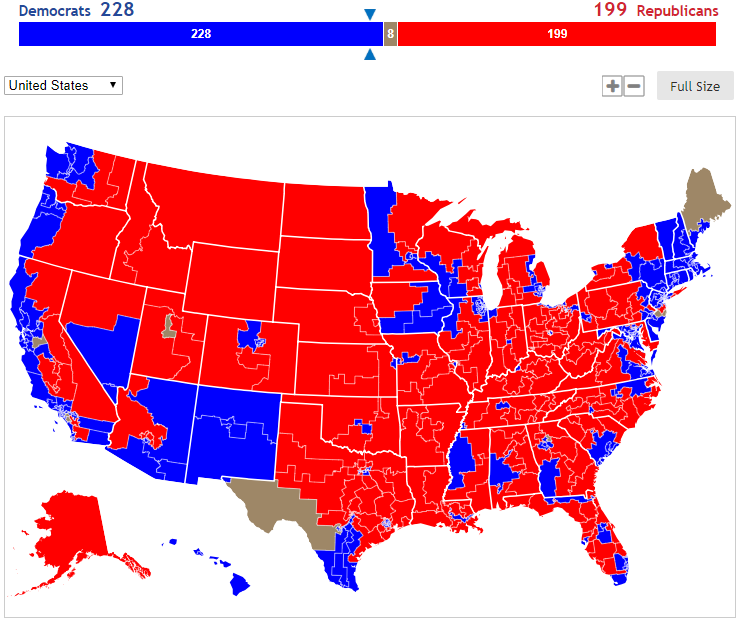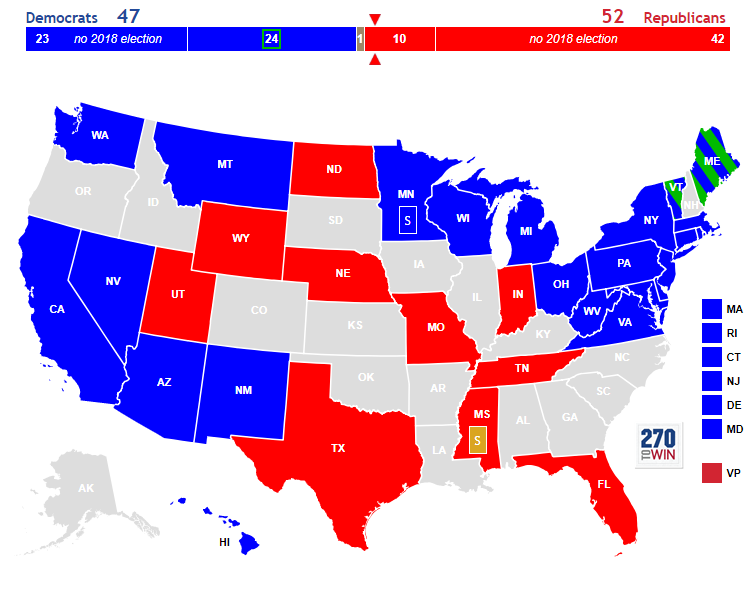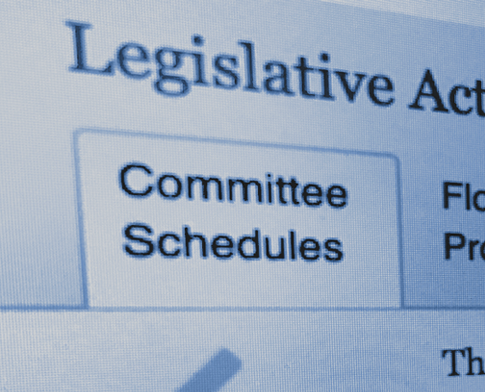| As projected above, House Minority Leader Nancy Pelosi (D-CA) will likely become Speaker of the House when the 116th Congress is sworn in on January 3, 2019. Pelosi, who served as Speaker from 2007 to 2011, issued a brief statement in September to Democratic colleagues detailing the party’s agenda for after the midterms. In the statement, Pelosi identified three broad areas of interest that will serve as the focus from the Democrat-controlled House:
· Lowering healthcare costs and prescription drug prices.
· Increasing pay through strong economic growth by rebuilding America.
· Cleaning up corruption to make Washington work for the American people.
In addition, Pelosi also stated the House will aim to address “vital legislation to protect Dreamers and to advance gun violence prevention.”
In a New York Times article published just a week before the midterms, Pelosi and other Democratic leaders announced they would “use their first month in the House majority to advance sweeping changes to future campaign and ethics laws, requiring the disclosure of shadowy political donors, outlawing the gerrymandering of congressional districts, and restoring key enforcement provisions to the Voting Rights Act.”5
Pelosi said Democrats will also spearhead legislation concerning the following:
· Campaign Finance Overhaul.
· Government by the People Act, a campaign finance overhaul measure designed to incentivize small donations.
· The DISCLOSE Act, a bill to require public disclosure of super PAC donors.
· The Voting Rights Advancement Act, a measure expanding the federal government’s ability to monitor state election procedures to prevent discrimination.
· The Election Security Act, a bill establishing grants for states to secure their voting systems.6
Oversight
Democrats are also likely to ramp up oversight in several areas. Rep. Elijah Cummings (D-MD) will presumably take over as Chairman of the House Oversight and Government Reform Committee. In that position, Cummings will likely seek to review Trump’s tax returns and the president’s other business ventures. Democrats have adamantly questioned potential conflicts of interest related to his personal finances and his administration (particularly emolument clauses related to his hotel dealings).Cummings would hold subpoena power with his position and could call for investigations into other members of the president’s cabinet, including Trump’s son-in-law and senior advisor, Jared Kushner.
Rep. Maxine Waters (D-CA), who will almost-surely chair the House Committee on Financial Services, has been one of Trump’s most outspoken critics since his presidency began. Waters stated she and House Democratic colleagues plan to investigate the president’s personal finances, including a probe into his relationship with Deutsche Bank. She said it was “ordinary” oversight work and that any use of such powers is not retaliatory.7 Like Cummings, Waters will now have the power to subpoena personal financial records from the Trump family related to any alleged dealings, which could result in a bitter partisan fight between House Democrats, House Republicans, and the White House.
Bipartisan Opportunities
There is opportunity for legislation that would benefit both parties such as:
· The proposed $1 trillion infrastructure package.
· Re-strengthening the ACA and extending coverage related to pre-existing conditions.
Sen. Mitch McConnell (R-KY) will continue his role as Senate Majority Leader and will likely face pressure from Republican colleagues to defend policies already passed during President Trump’s first two years. McConnell has remained firm in his goal of filling the judiciary with President Trump’s judicial nominees, calling it his “top priority in setting the agenda here in the Senate.” So far, McConnell has led the confirmation of two Supreme Court justices, 29 circuit judges, and 53 district judges during Trump’s presidency and the administration will surely add dozens more after gaining seats in the Senate.
Funding for President Trump’s wall along the US-Mexico border will likely continue to be an intense debate between congressional leaders. “There’s no question this will be on the top of the agenda,” Sen. McConnell said, regarding the 116th Congress’ agenda for 2019.8 McConnell spoke with Pelosi the day after the midterms, and stated his intentions to move forward with funding for the border wall.
While many Democrats have universally condemned the construction of President Trump’s border wall, Senate Minority Leader Chuck Schumer (D-NY) could find common ground with Sen. McConnell on border security.
“Democrats believe in strong border security,” Schumer said. “We’re going to keep fighting for the strongest, toughest border security.” Schumer’s remarks could pave the way for compromise regarding legislation on the Deferred Action for Childhood Arrivals (DACA) with funding for the president’s border wall.
Trade
Several trade deals with foreign allies will continue into the 116th Congress, including the restructuring of the North American Free Trade Agreement (NAFTA), which has been re-negotiated as the United States Mexico Canada Agreement (USMCA). Sen. McConnell said the vote to approve the USMCA will be a “next year issue.” In addition, three other trade deals will be further addressed:
· The US-Japan Trade Agreement, which would link the world’s first and third largest economies, seeks to “further expand trade and investment” between the two countries.
· The US-EU Trade Agreement, which seeks “to address both tariff and non-tariff barriers, and to achieve fairer, more balanced trade.”
· The US-UK Trade Agreement will not be officially negotiated until the UK leaves the EU on March 29, 2019. The goal of this agreement would be to “remove existing goods and services tariff and non-tariff barriers by developing cutting edge obligations for merging sectors where US and UK innovators and entrepreneurs are most competitive.” |






